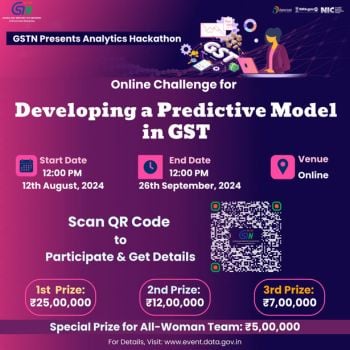GSTN is inviting submissions for Analytics Hackathon on Developing a Predictive Model in GST for the year 2024. The last date of application is September 26.
The purpose of this Hackathon is to engage Indian students, researchers, and innovators in developing advanced, data-driven AI and ML solutions based on given data set. Participants will have access to a comprehensive data set containing approximately 900,000 records, each with around 21 attributes and target variables. This data is anonymized, meticulously labeled, and includes training, testing, and a non-validated subset reserved specifically for final evaluations by the GSTN.
Participants are encouraged to use this dataset to design and implement innovative artificial intelligence (AI) and machine learning (ML) algorithms to tackle the stated challenge.
Additionally, this initiative aims to foster collaboration between academia and industry professionals, driving the development of effective and insightful solutions that strengthen the GST analytics framework.
Indian students or researchers associated with educational institutions, or working professionals associated with Indian startups and companies can participate in the Hackathon. The participant must be the citizen of India.
Structure of the hackathon
Given a dataset D, which consists of:
Steps:
Define a predictive function Fθ(X) parameterized by θ that maps input features X to predicted outputs Ypred.
The model Fθ(X) should be designed to capture the relationship between the input features and the target variable effectively.
2. Training:
Optimize the model parameters θ by minimizing a loss function L(Y,Fθ(X)) using the training data Dtrain
Consider incorporating feature transformations, feature engineering, or feature selection to enhance the model’s predictive performance.
3. Testing:
Apply the learned model Fθ *(X) (with optimized parameters 𝜃∗) to the test data Dtest to generate predictions Ypred for each input Xj∈{X1,X2,…,Xm1}.
4. Performance Optimization:
Evaluate the model’s performance by calculating accuracy or other relevant metrics M on the test predictions Ypred_test.
Refine the model by iteratively adjusting θ or modifying Fθ(X) to improve performance on the chosen evaluation metrics M.
5. Submission:
Present the predicted outputs Ypred_test along with a detailed report that includes:
** Kindly refer ‘Submission and Expectation’ page before submitting your solutions.
TECH STACK FOR BUILDING AI/ML BASED ALGORITHM
Interested candidates can register via this page.
The Hackathon offers significant prizes for the top-performing teams, and these are:

